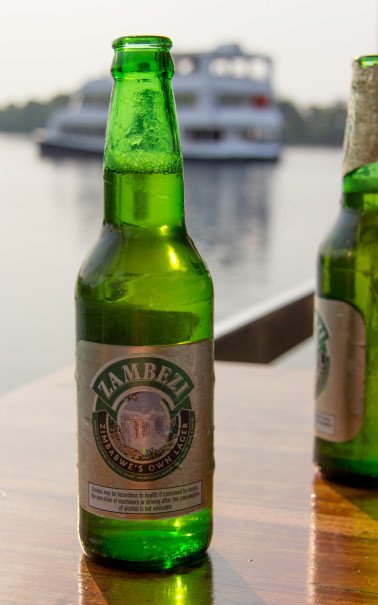
Lions, Impalas and Beer in the Bush

Lions, Impalas and Beer in the Bush
During the second-to-last spring of the 20th century, when heavy rains gorged the Zambezi River and hid Victoria Falls entirely in mist, I was not quite killed by my own stupidity. But almost.
Though I wouldn’t have admitted it at the time, I was feeling rather rugged and accomplished that March of 1998; I’d survived four years of medical school and four weeks without my cushy American comforts while working at a medical clinic in Gambia. The long-planned reward for all that was a safari in Botswana, capped by a visit to Mosi-oa-Tunya, “The Smoke That Thunders”—better known, since Dr. Livingstone got there, as Victoria Falls, one of the seven natural wonders of the world.
It was evening by the time my friend and I had settled into our hostel by the falls, and as soon as we’d dropped our bags, we headed out on foot to a restaurant at the northern edge of the town locals called Vic Falls. One step outside the tiny Zimbabwe settlement was a step into wilderness: game preserves hundreds of miles across. A dustiness softened the landscape, as if winds from the Kalahari Desert had blown across its roads, but otherwise Vic Falls looked like an American suburb, with tidy ranch homes, mowed lawns, and paved streets. The bell frogs plinking like glass chimes in the high grass and the strangled nighttime screams of the hyena seemed far, far away.
The open-air restaurant just off of Squire Cummings Road was called the Boma. Under its thatched roof, we celebrated the whole trip by eating some of the animals we’d seen on safari. We dined on exotic dishes like warthog, impala, and Mopani worms (fried caterpillars), and drank Zambezi beer, a refreshing lager named for the river that feeds Victoria Falls. Afterward, slightly intoxicated and carrying a doggie bag for the hostel’s overworked manager, we wandered in the last remaining daylight toward our beds.
Without street lights or even a single lamp on in one of the ranch houses, Vic Falls acquired a strange and slightly menacing desolation. The darkness, the warm air, and the beer conspired to muddle our senses. We got lost. But we were able to retrace our steps to the restaurant, where we hired a cab.
When we told the cab driver we’d tried to walk back, he stopped the car and turned to face us. “NEVER do that at night!” he said. “There are LIONS around here!”
Despite the proximity of the bush all around, I didn’t quite believe him. Only fools would walk around in the dark with lions. A guide had told us about some drunk tourists who fell asleep outside their tents and got eaten, and we’d laughed at them: What idiots! But walking around in the dark with lions and carrying a bag full of impala, the natural prey of the lion—that would have been beyond any recorded tourist idiocy. And after the four years of medical school and the four weeks in Gambia, I was no idiotic tourist but a man of the world.
Having admonished us, the cabbie resumed driving, rounded a corner, and slammed on the brakes again. Two enormous bull elephants stood in the middle of the paved road, one of them gnawing on a large detached tree limb with an expression that all but said, “I told you so.” We waited for the elephants to move while fireworks went off in the distance—from Elephant Hills, the driver said, that hotel with the casino.